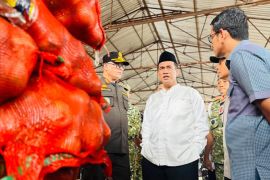Jakarta (ANTARA) - Assistant Director of the Department of Sharia Finance of Bank Indonesia (BI), Misha Nugraha Ramadhan, highlighted that transactions for halal products through e-commerce had increased in 2021, both in terms of volume and value.
This phenomenon results in the increasing use of non-cash payment methods in all e-commerce transactions.
"Digital technology has played an important role in the development of Micro, Small, and Medium Enterprises (MSMEs), including Islamic MSMEs and Islamic finance, both in terms of purchases and payments," Ramadhan noted at the G20 Presidency Side Event: Synergy Seminar on Building Resilient in MSMEs Post Pandemic, monitored online on Friday.
He later conveyed that the COVID-19 pandemic had changed the people's behavior in shopping activities, with the trend of online shopping continuing to increase.
BI noted that the share of halal products through e-commerce was dominated by fashion products, at 91.93 percent; followed by personal care and cosmetic products, at 2.57 percent; food and beverages, 1.66 percent; and books and stationery, 1.81 percent.
Furthermore, electronic products contributed 0.45 percent; automotive and accessories, 0.4 percent; and other products, 1.2 percent.
Ramadhan noted that fashion had become one of the main sectors of the halal value chain (HVC) in addition to halal food, agriculture, and Muslim-friendly tourism that had succeeded in encouraging the recovery of the national sharia economy.
Related news: Islamic banks should play three crucial roles: VP Amin
"In 2021, the four sectors experienced an expansion of 2.11 percent as compared to 2020," he noted.
Hence, he believes that collaboration among ministries and agencies, associations, communities, and business actors had succeeded in providing positive results for economic growth and Islamic finance in Indonesia.
In BI, the policy on economic development and Islamic finance is part of the supporting policies for the main policy.
Ramadhan explained that one of the approaches to implementing macroprudential policies is by strengthening MSMEs, including sharia MSMEs.
"BI is also striving to maintain stability and the national economic growth, especially at a time like this in the era of national economic recovery," he concluded.
Related news: Expect digital finance to spur national economic growth: VP










